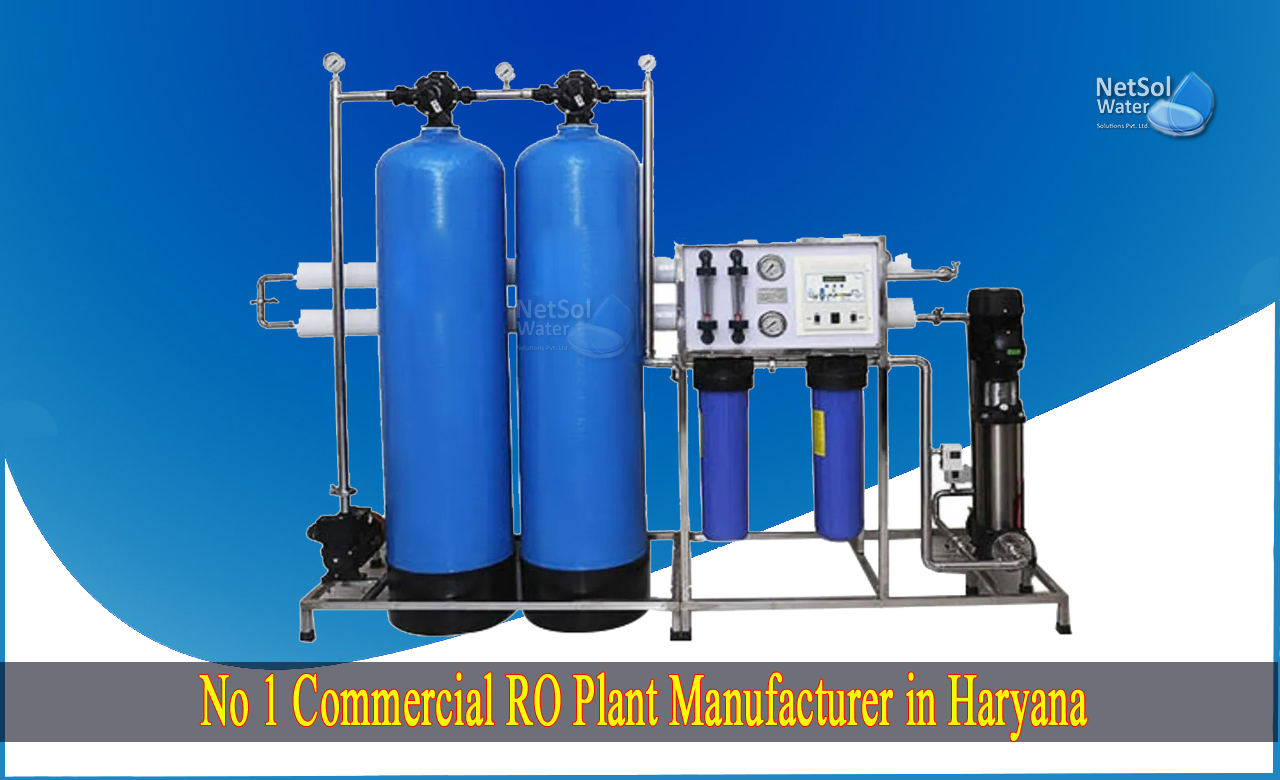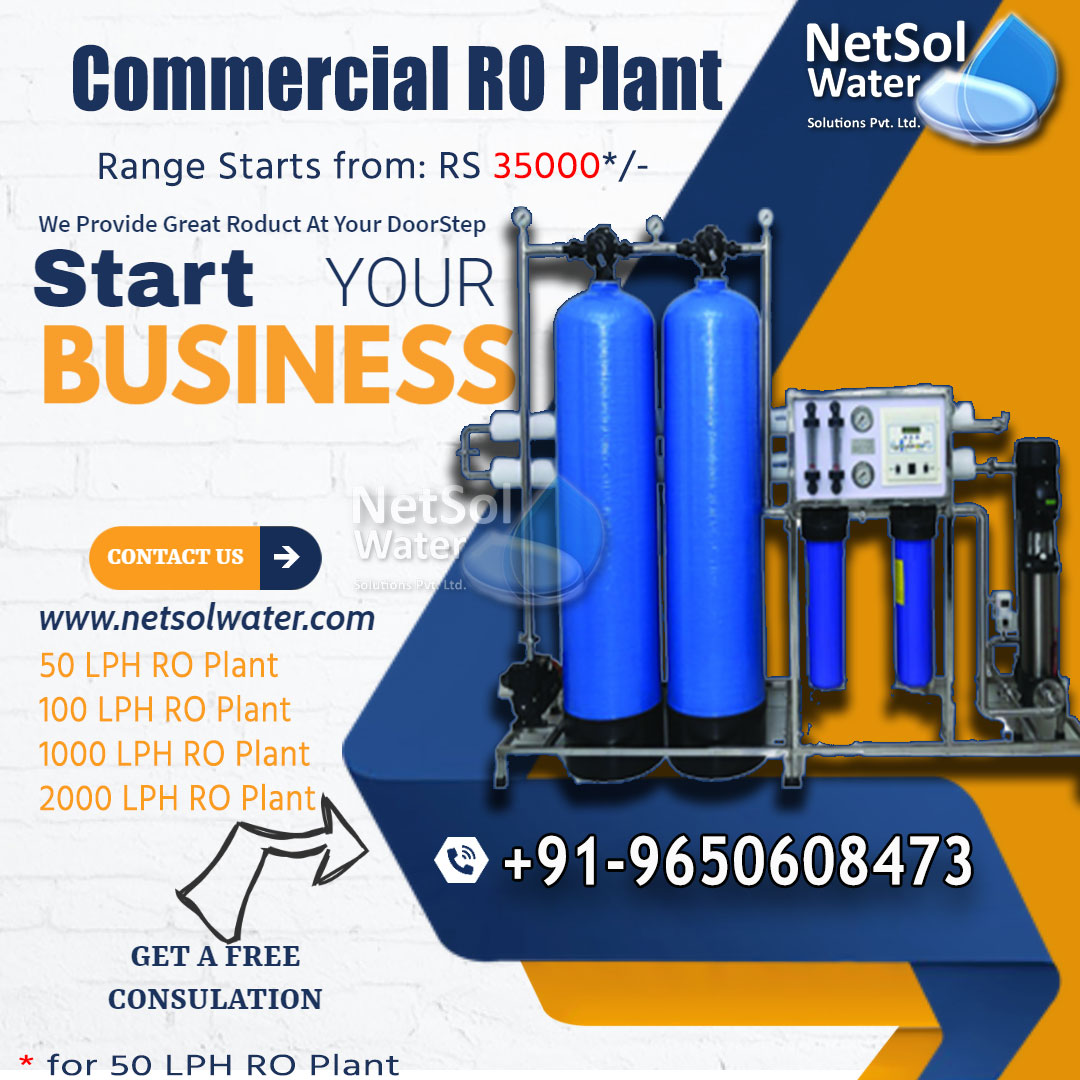Who is the No 1 Commercial RO Plant Manufacturer in Haryana?
Pure water is a crucial and necessary factor for improving people's life in Haryana's business region. As a result, Netsol Water, the most renowned producer of all sorts of water and wastewater treatment plants, including commercial RO plants, gives you the finest RO plants in various capacities with user customization experience.
But, what is Reverse Osmosis?
Reverse Osmosis is a membrane-technology or a filtering method that removes large molecules and ions from solutions by applying pressure to the solution when it is on one side of a selective membrane.The solute is held on the pressured side of the membrane while the pure solvent passes to the other side. Overall, the membrane prevents big molecules or ions from passing through the pores, allowing only the smaller components of the solution to pass.
How does a Reverse Osmosis system function in a commercial setting?
Previously, commercial sectors just had UV and filtration devices. Due to the increased number of minerals present in water, numerous group-housing societies in various cities of Haryana have developed household water purification systems, resulting in a global need for Commercial RO Plants.Based on the number of residents, each society builds a Commercial RO plant. Dissolved inorganic materials (such as salts) are removed from a solution using a Reverse Osmosis system.
Commercial RO Plants are manufactured in many sorts and capacities and the main types of reverse osmosis systems are determined by the quantity and kind of membranes or filters utilized in commercial locations. Aside from the systems, the RO is also determined by the filters and membranes utilized. Industrial purification systems with capacities of 500 LPH and higher are employed in companies as well as group housing societies.
The following are the steps involved in purifying water through Commercial RO Plants-
- A sediment filter traps particles such as rust and calcium carbonate.
- It also contains a second sediment filter with smaller holes.
- An activated carbon filter is used to catch organic compounds and chlorine. The TFC reverse osmosis membranes will ultimately be attacked and degraded as a result of this.
- A second carbon filter is available as an option to catch contaminants that are not eliminated by the RO membrane.
- There is an optional ultra-violet lamp for sterilizing any germs that may evade the machine's reverse osmosis membrane.
What are the benefits of utilizing Commercial RO Plants?
1: Our systems may be simply installed or linked to water supply points in commercial places with ample space.
2: Our Commercial RO technology offers one of the greatest contamination rejection rates of any water filtration device.
3: They are environmentally friendly and do not employ any harmful chemicals or by-products.
4: Commercial areas can have a separate storage tank for rejected water, which can then be used by apartment members via pipelines.
5: Our Commercial RO Plant improves water quality by removing all chemical and biological impurities. It also enhances the flavour, odour, and appearance of water. It consumes less electricity.
There are a few drawbacks of utilizing RO plants which can be easily handled by us!
-This method uses a big amount of water in commercial locations, resulting in the removal of a large volume of water.
-If the commercial sectors drain the rejected water, the excess flow of water might endanger the septic systems in the apartments.
-The RO filter will not function properly if the incoming water flow is not high in pressure.
But, apart from these drawbacks which can be easily solved, there are other benefits too!
1: They get rid of hard water
Hard water in commercial regions corrodes all geysers, pressure cookers, water containers, pipelines, and so on. This further reduces the quality of washing in machines, increases detergent use, and inhibits soap from lathering while taking a bath or cleaning dishes.This also leads to improper cooking, degrades the flavour of many culinary dishes, and fails to relieve thirst. Softeners play an essential role in such circumstances, since they may be put in huge centrally located systems, which can then be connected to smaller RO units to supply soft water to the whole commercial areas.
2: They remove all TDS
An RO in an apartment also eliminates 90-95 percent of the TDS from water. Because hard water cannot be directly put into a Commercial RO Plant, the TDS must be removed. The apartment residents might split the expense of installing a central RO system for clean water.
How much does a Commercial R.O. Plant costs approximately?
A 1000 litres per hour commercial RO unit with a PVC pipe system costs roughly Rs. 2,50,000. The same capacity unit with a stainless steel system might cost up to Rs. 3,10,000.
Our systems can be employed in societies, apartments, complexes, etc. Before installing the Commercial RO Plant, the water in the region is tested separately.If you have any additional questions, please contact us at +91-9650608473 or email us at enquiry@netsolwater.com




